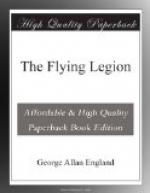Lebon dismounted from the one surviving animal, and stepped fair into a scorpion’s nest. The horrible little gray creature, striking up over its back with spiked tail, drove the deadly barb half an inch into the orderly’s naked ankle.
The Master scarified, sucked, and cauterized the wound. Nothing availed. Lebon, in his depleted condition, could not fight off the poison. Thirty minutes later, swollen and black, he died in a frothing spasm, his last words a hideous imprecation on the Arabs who had enslaved and tortured him-a curse on the whole race of Moslems.
Shaken with horror, the woman and the man buried Lebon, loaded the remaining water-bags, the guns and food on to the one camel and dragged themselves away on foot, driving the spent beast. Obviously this camel could not go far. Blindness had stricken it, and its black lips were retracted with the parch of thirst.
They gave it half a skin of water, and goaded it along with desperation. Everything now depended on this camel. Even though it could not carry them, it could bear the burden of their scant supplies. Without it, hope was lost.
All that night they drove the tortured camel. It fell more and more often. The Master spared it not. For on its dying strength depended the life of the woman he loved.
The camel died an hour before dawn. Not even vultures wheeled across the steely sky. The Master cut from its wasted flanks a few strips of meat and packed them into one of the palm-stick baskets that had held the cameleers’ supplies. With them he packed all the remaining food—a few lentils, a little goat’s-milk cheese, and a handful of dates fried in clarified butter.
This basket, with a revolver and a handful of cartridges, also the extra slippers taken from Leclair and the orderly, made all the burden the woman could carry. The Master’s load, heavier far, was one of the water-skins.
This load, he knew, would rapidly lighten. As it should diminish, faster than the woman’s, he would take part of hers. Thus, as best they could, they planned the final stage of their long agony.
Before starting again, they sat a while beside the gaunt, mangled camel, held council of war and pledged faith again. They drank a little of the mordant water that burned the throat and seemed in no wise to relieve the horrible thirst that blackened their lips and shriveled all their tissues.
“I think,” the Master gasped, “we can make an hour or so before the sun gets too bad.” He squinted at the crimson and purple banderoles of cloud through which, like the eye of a fevered Cyclops, the sun was already glowering. Already the range of obsidian hills ahead of them, the drifted sands all fretted with wind-waves, the whole iron plain of the desert was quivering with heat. “Every hour counts, now. Before we start, let us agree to certain things.”
She nodded silently, crouching beside him on the sand. He drew an emaciated arm about her and for a moment peered down into her face. But he did not kiss her. A kiss, as they both were—some fine delicacy of the soul seemed telling him—would have been mockery.




